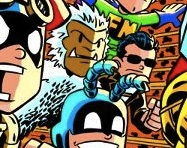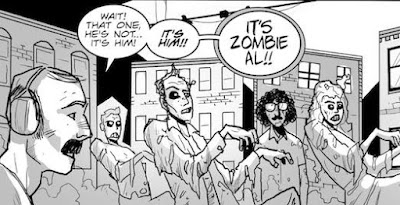Comics have always been a visual medium, but much to the dismay of many within the industry, they are also a print medium and that presents challenges that many similar forms of entertainment are facing: how to stay relevant and profitable in an age of increasing digital competition.
Even though comic book companies have seen and acknowledged an oncoming digital presence for their characters for more than a decade now, most are still struggling to define just how they want to represent themselves in an electronic field, and some attempts to branch out are better than others.
Both Marvel and DC, for example, are experimenting with selling digital copies of their comics in the very comics themselves - that is, if you buy a copy of the book, you can download an electronic version as well. Marvel is, so far, including a download code for free, while DC is charging an extra dollar for the privilege.
This practice irks me at least a little, because behind this good deal (at least on Marvel's part) is a bit of sneaky marketing. Both companies polybag their combo books, sealing them in until after they're purchased. On the surface, this is so someone can't walk into a comic shop, scan the code, walk out without buying anything, have the comic on his or her e-reader, and render the one-time code invalid for someone who might actually purchase the book.
It's also, though, a way for companies to boost sales by having some of the more rabid consumers purchase two copies of the same book. Due to their (perceived) collectibility, some buyers won't want to tear open the bag these comics come in, leaving them with a choice - either seemingly deface their collectible item, or spend twice as much to keep one copy in tact.
Companies obviously are aware of this, and while I won't say it's malicious on their part that they do this, it does seem to me like taking advantage of the psychosis that is collecting (that's consumerism for ya). In a matter of weeks, Marvel's entire Ultimate Comics line will ship exclusively in polybags with download codes, which will put this practice to the test.
Other practices, however, are more in line with what I think comic book companies should be doing, taking advantage of the new capabilities that technology offers while still remaining true to the spirit of comics.
Marvel's recent relaunch of Daredevil, written by Mark Waid, has been a highlight of superhero comics in 2011. Not that I'll ever discount Waid's writing, as he's been involved with some of my favorite comics of all time, but DD is really a treat to read every month.
Daredevil has always, for obvious reasons, had a strong following with visually-impaired comic readers, and Marvel finally took advantage of that by releasing an audio version of the first issue, read by Waid and a few others, free for download. This is both a nice treat for fans in general as well as the aforementioned visually impaired, and is exactly the type of thing that big companies like this should be doing.
The direct link to the file is here: http://marvel.com/files/podcasts/DAREDEVIL_1_edited.mp3. A little more info is on Marvel's site, here: http://marvel.com/news/story/16485/daredevil_1_audio_edition.
USA Today, while not being my favorite site for actual news, has had a pretty good relationship with comic companies over the past several years. I still wonder why the paper doesn't print daily comic strips, but every once in a while they'll print comics and put them in front of a substantially larger audience size than they'd otherwise get. When DC put out Wednesday Comics a few years back, the paper actually printed some to promote the series, and it had a strong web presence as well.
Dark Horse Comics went a bit further and released an exclusive digital Conan the Barbarian comic by Ron Marz and Bart Sears, who coincidentally (a hem) went on to produce a two-issue miniseries, Conan: The Island, another example of a company taking advantage or digital means to promote the physical product.
The full Conan story, "Kiss of the Undead", can be read here: http://www.usatoday.com/life/comics/2010-11-22-kissoftheundead22_ST_N.htm
Lastly, Marvel and Toyota have teamed up for an ad campaign that features short Robot Chicken-inspired videos with action figures and the Toyota Yaris. It's a pretty bizarre combination, and it's beyond tame, but it's just another example of what a comic company can do when management embraces digital marketing.
This video is, of course, just an advertisement when it comes down to it, but it's still fairly interesting. You can watch more of the Marvel/Toyota videos here: http://www.earnhardttoyota.com/tag/its-a-car/.










































































